
Want all the hottest music and gear news, reviews, deals, features and more, direct to your inbox? Sign up here.
You are now subscribed
Your newsletter sign-up was successful
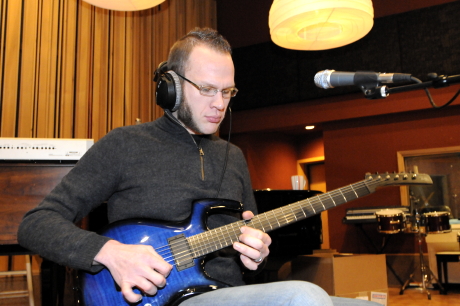
Guitarist, producer, bassist, drummer… Adam Dutkiewicz does it all on Times Of Grace's debut album, Hymn Of A Broken Man. An album that sees him reunited with his former Killswitch Engage bandmate Jesse Leach.
It's an album born out of a dark time for the lighthearted Dutkiewicz we're used to seeing onstage with Killswitch Engage, and reflects another side to a man who has proved himself to be one of modern metal's brightest talents. We find out more about Adam's struggles that influenced the new album, his musical approach and guitar gear.
Guitarist: It's great to hear you and Jesse making music again together…
Adam: "It was just so natural - it felt great. Our friendship has remained tight for a number of years, and it's always cool to have that friendship when you're making music together. Like a family."
This album came out of a very difficult time for you when you had a very serious back problem - can you give us an overview of what happened?
"The record itself was a cathartic thing, it wasn't even just my back. It stemmed from that; for the two years we were working on the recording Jesse and I were hanging out and talking about the rough things we'd been through. Personal issues and things like that.
"But it all stemmed from the time I had to have emergency back surgery here in London. That's when I started writing the music and I'll be honest, most of the record was written from my hospital bed. I needed something to drive and motivate me - to pick me up out of the depression and anxiety I was going through. Thinking I wasn't going to be able to play in Killswitch Engage anymore - to travel and tour."
Want all the hottest music and gear news, reviews, deals, features and more, direct to your inbox? Sign up here.
"I needed something to drive and motivate me - to pick me up out of the depression and anxiety I was going through. Thinking I wasn't going to be able to play in Killswitch Engage anymore - to travel and tour."
How is it now?
"I'm feeling pretty good. Travelling doesn't make it any easier but I can't complain - it's a heck of a lot better than it was that's for sure."
At that point in time when you were lying there in the hospital, you didn't know if you'd be able to walk again?
"Yes, that was the whole reason I had to have the emergency surgery. The doctors said, Listen if you don't do something about this right now your chances [aren't good]. At that point I couldn't stand up on my own so there was a chance of permanent damage. I thought, I better have the surgery then!"
Is it true that you wrote these songs in your head during recovery?
"It's kind of strange. I usually write music without an instrument, in my head, but I'd never written pretty much a whole record like that - it just kept coming and wouldn't stop. I let it pour out of me."
Did you immediately think of Jesse for the songs?
"No, Jesse was a complete afterthought because this was initially a personal thing for myself. It was music I was writing for me but after all was said and done, I had a good chunk of music down and was writing lyrics and singing ideas. I didn't have enough confidence in myself as a singer to put the whole record together so I might call someone who is a really good lyricist and a really good singer."
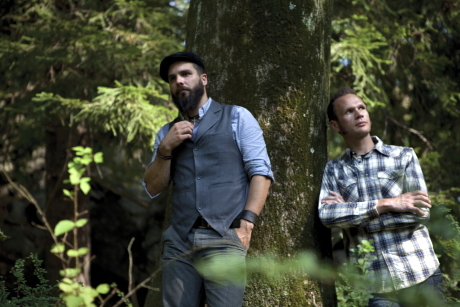
"I usually write music without an instrument, in my head, but I'd never written pretty much a whole record like that - it just kept coming and wouldn't stop."
How did the creative process work between you both?
"Once I was up and on my feet again, literally, I was taking a lot of the ideas I had and developing them. I had a tape recorder and had been singing some of the ideas into that. From that and what I had in my head I got them into a demo form so at least the parts were down. I would send those to Jesse and I would send him my lyric ideas and he would take those and extend on them. He might rewrite parts too and there were also songs I sent him that already had my vocals on them - the way I thought they could be.
"He would also come to the studio and he'd either have the song mapped out already or he'd have pages of poetry and lyrics written we'd try to write it together. We'd come up with ideas together - it was very collaborative to be able to do that. A lot of back and forth - he would fix my ideas and I would fix his. It was the true meaning of collaboration - it felt great."
You can definitely hear that in the way vocal dynamic between you on the album…
"We've never really done that before with anyone and we were both shocked. Two guys literally just singing together."
But when you were writing these songs were you even considering that they'd ever be released or was it just something for yourself at the time?
"That's the funny thing because with this record it's so completely different because normally I'm writing music for fans and for the other dudes in the band to listen to - making something I think the other Killswitch guys are going to like. This time I wrote music for me. It's almost a selfish thing to say that but there were never any intensions to release this to begin with and take over the world with it."
So was this the first time you'd worked together writing since Killswitch Engage?
"Yes the last thing we did together was [2002's] Alive Or Just Breathing. It was very different this time - you could tell we'd both matured a lot. Especially Jesse with his voice.
"Back when we did Alive Or Just Breathing he was still very new to the whole singing thing - or he at least perceived it in a different way. He didn't have much confidence, he was always second guessing his own abilities. This time you could tell he was a lot more comfortable with his voice and he definitely knew his limitations this time. Confidence is half of anything when you're doing music that's for sure."
There's a lot of positivity coming out of the darkness with this album - does that reflect your own journey?
"Absolutely. One thing I've always believed in, is that if you're handed a bad situation you can either sit there and mull over it or you can try and fix things as best you can and try to move on. That's the positive way to move forward in any circumstance."
"I'm not someone who tends to think about parts, I think about songs all the time."
You've produced yourself on records with Killswitch Enagage in the past but was this process different?
"If anything it was a little more comfortable because the only person I had to answer to was myself. It made it pretty easy."
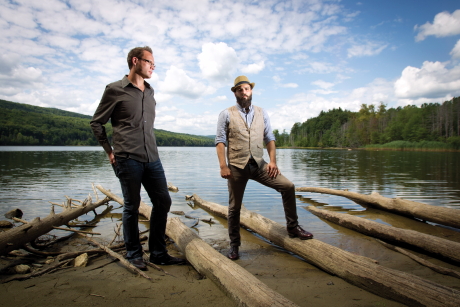
Vocalist Jesse Leach (right) fronted Killswitch Engage for their first two albums before he left the band in 2002
Is it fair to call you a perfectionist in the studio?
"In as much as I can be - I always try to make everything the best it can be. But no one's perfect."
What's it like switching between the mindset of musician and producer or do they become one thing?
"It's always been kind of natural to me - I'm not someone who tends to think about parts, I think about songs all the time. You always do what's best for the song with the individual instrument."
You went back to playing drums for this album, had you regularly played since you switched to guitar in Killswitch Engage?
"Not at all - to be honest I don't really rehearse on any instruments. I just wing it! That was probably the most difficult instrument for me to pick back up because all the nerve damage in my leg from the surgery. I couldn't get any of the fast passages together very well with my feet. It was extremely difficult and I think that was the biggest challenge for me. Just trying to get my feet back. The double kick parts were the hardest to tackle."
Do you feel like a guitarist or drummer at heart… or just a musician?
"I feel like a jack of all trades, master of none. I'm not a bassist, drummer, guitarist or singer specifically - I like everything about music. That's why I started producing records, it made sense for me to approach it to just make music. To be honest I've always seen myself that way. I never claimed to be a great musician with any instrument I play to be honest.
"I see myself more as somebody who likes to create music - not specifically a guitarist, drummer, singer or bass player. I try to do the best I can with all those things - hack my way through it!"
Looking back on your experience laying down the bass tracks for this album - do you think a lot of guitarists overlook the role of the bass?
"Good basslines are an art form - they can compliment the groove and the harmony of the entire material. If you have a guitarist who's just playing the guitar parts on bass that can be the right part once in a while, but at the same time you want something that compliments the song in a unique way. That's something I've always respected; people that can discern the difference between the two."
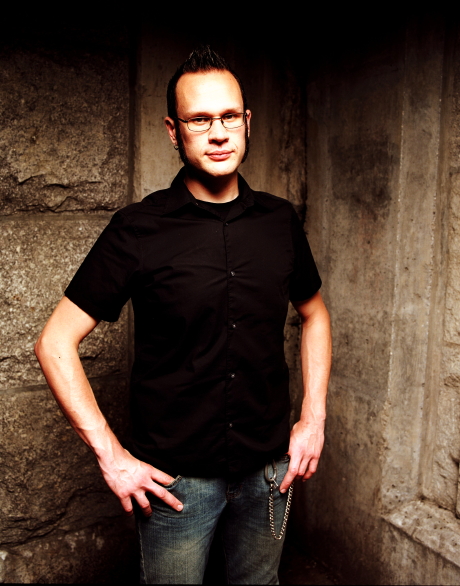
It's interesting to hear the vocal dynamic you and Jesse on this album - has your own confidence grown as a singer?
"Yes it has a but to be honest with you, it's still something I struggle with because I don't like hearing my own voice sometimes. But it's something I love doing, because it's one of the most musical expressions a person can have. I enjoy doing it, I just hope I get better at it because it's fun."
You contribute vocals to Killswitch but not as much as with Times Of Grace, do you think this will make the music more of a challenge for you to play live?
"Yes, it's about balancing which guitar part I need to play when singing any main vocal. It shouldn't be too bad but I'm a bit nervous about actually singing - it's definitely stepping up my duties a lot. I sing a bunch of stuff for Killswitch but I'm stepping it up for sure. I'm excited about it though.
You even take the lead vocal on the closing song Fall From Grace…
"That's definitely one of the pinnacle songs that came out of me - it was very very natural to write."
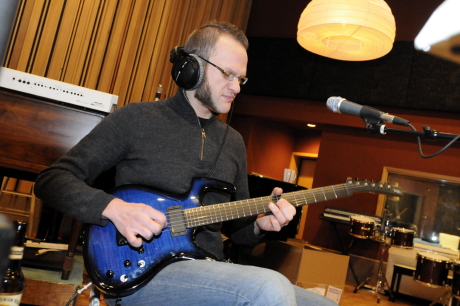
The End Of Eternity is quite a change for your songwriting style, some of the guitars have a brooding Neurosis feel to them…
"Ah cool. The ideas for the music really just spilled out of me - the lyrics as well. Thinking about things and realisations. That's a pretty deep song, lots of different things about the lyrics in that song that I'm very, very proud of."
There's a lead section in Hope Remains that stands out too, is playing lead something you enjoy?
"I like playing leads, I don't want a wankfest or anything like that but once in a while it's a cool musical departure to have in a song. It's natural to me and I like it once in a while - not all the time."
Times Of Grace - Hope Remains
How do you about how you've developed as a guitarist since the early days? Your rhythm technique is very strong…
"Not really! [laughs] I'm not technique driven at all. I never really aspired to be anything fantastic as a player, it's about making music first and foremost. It's about songwriting. Good songs really move me - whether they're metal songs or otherwise."
Looking back, who were the players that inspired you to pick up a guitar?
"First and foremost it was Eddie Van Halen - the Van Halen brothers actually because I was drumming as well. Then I got way into the metal of the early and mid nineties - Carcass, At The Gates and all that stuff."
What players out there do you rate at the moment?
"Jeff Loomis is fantastic, untouchable. But there's so many great guitarists out there these days that it's just shocking."
In The Arms Of Mercy and The Forgotten One, the acoustic tracks musically recall the ones that used to appear in the older Killswitch Engage albums - have they always come from you?
"A lot of them would have. I don't usually write electric ideas on an acoustic though. It's really strange - I can't tell you enough how often I write without an instrument when I'm sitting around thinking about something. An idea will just pop into my head then from there I'll grab a guitar."
Times Of Grace - In The Arms Of Mercy
How will a song then come together?
"There will usually be several ideas that come from that one, it's really weird how I'll get rolling with an idea and then the song's completed ten minutes later."
But do you ever stockpile recordings of your riffs and use them for songs?
"I've done that in the past that's for sure. But with most of this record it worked differently. I'll come up with a riff that will get the vibe going and it leads to the rest of the song. It's like the rest of the song writes itself. It's mainly sparked by one big theme and then the rest of it just falls into place. I've definitely been stuck with riffs in the past though that I couldn't finish."
It must have been frustrating having all these ideas in the hospital and not being able to record them?
"A lot of the time I can remember something for weeks and weeks - but I've also had really cool musical ideas and thought, man I've got to remember that and then it's gone forever! But when you lie around all day in a hospital bed with nothing to do you can remember things because you're not doing anything else. But this was a pretty unique thing for me, being able to lie around and dream up a record."
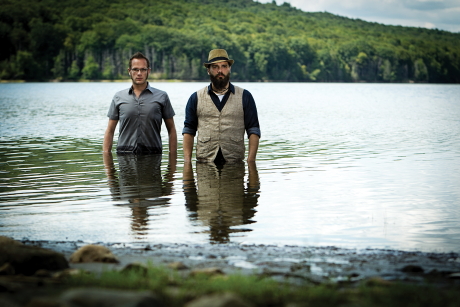
What was you gear setup for this album - did it change from what you use with Killswitch Engage?
"I've stopped working with Parker now, although I used a Fly on the album. They had a tremendous revamping of their company… so I wasn't in touch with those guys any more, and now I'm actually playing a PRS. Downsizing - it's the state of the music industry, man. It's crazy."
"I've always respected PRS guitars, I just never got one because they're so damn expensive!
What model?
"A Custom 22 - I have a green one and a blue. I'm using the Dragon 2 pickups. To be honest with you I'm regretting not using [active] EMGs on the record because I had a lot of problems with the guitar tones but at the end of the day it still sounds alright. I didn't use the PRS [Dragon II] pickups on the record, I think I ended up using Seymour Duncans and they were all passive. It's a small regret."
What do you like about your PRSs?
"I've always respected their guitars, I just never got one because they're so damn expensive! But the one thing I've always loved about them, you know when you sit down with a guitar and you play it and it just sings, it resonates? You can just tell. Guitar companies just don't make guitars like that anymore. [My PRS] is just such a nice piece of wood. It just rings in your hands, it's really really noticeable."
Do you not tend to use a selection of guitars when you record? Do you stick to one?
"To be honest with you I use whichever one sounds the most in tune! Intonation is the biggest issue for me when recording, I want to make sure it sits perfectly in the sound."
Do you ever use single-coil pickups for cleans?
"No always humbuckers - single-coils can get a bit too twangy. I wanted a dark, ominous tone for most of the parts of this record."
What about amps?
"[Peavey] 5150, Framus Cobra and then Fender Vibrolux for clean tones. Cabs were Mesa with Vintage 30s. I had the amps left and right - it's a wider stereo image.
"I used my old 5150 a lot though - it's one of the first series ones. They sound the best. It gurgles and sounds a little more focused than most 5150s. It's my go-to head and I believe they modelled after the old Soldanos so it's kind of the same sound - lots and lots of gain, very hot rodded gain. I used the Framus Cobra for a lot of the overdubs and leads."
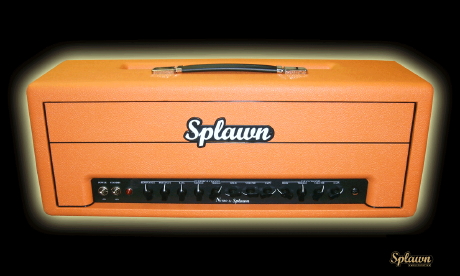
What amps are you using live these days?
"A Splawn Nitro. A small company in the US. Basically it sound like a Marshall 800 with tremendous balls - much more low end than a regular Marshall. I like definition in the upper mid range - not too fizzy at the top."
Did you use any modeling software for guitar tones?
"I've been known to use [Line 6] Amp Farm. Never for anything super high gain though - I want to hear the valves cranking on something like that."
Do you think that digital modeling can ever be a substitute for a mic'd valve amp in the studio?
"I hope not because I think there's a charm in that. It's the real deal: hearing an amp in a room making a lot of noise. I don't think you can substitute that."
So when it comes to metal, you would always recommend people mic their cabs over using modelling technology?
"Mic'ing a good guitar cabinet is pretty much the only way for a really, really good overdriven high gain sound. I actually use amp modelling for clean sounds a lot - little bit parts to accentuate other parts. But for the main real deal you need to use cabs."
Do you have any other tips for guitarists who want to get into recording? Any common mistakes you've come across as a producer?
"Honestly it's as easy as getting a good guitar head and cab with a mic in front of the speaker. You have to start with a good tone. A recording is as good as the sum of its parts. Use bad equipment and you get a bad sound!"
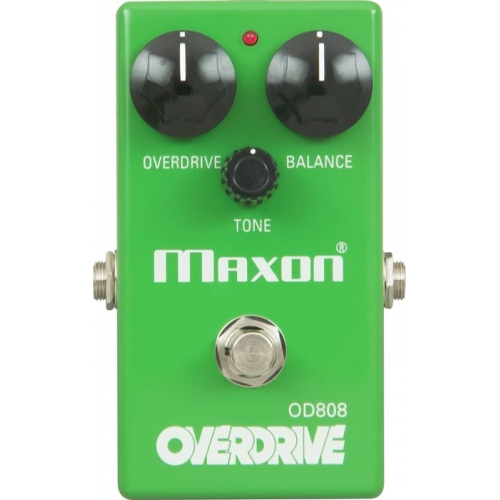
Are you still using Maxon for delay?
"Yes, a little bit of analogue delay here and there. I use the Maxon 808 overdrive for pretty much every high gain situation - it gives the tone a little more definition and kick."
Have the Killswitch guys heard the record yet?
"Yes everybody was very supportive. They've been very cool with it and all very stoked."
Do you think Times Of Grace will only focus on the album when you play live or have you considered playing material from his era of Killswitch?
"It's something we haven't talked about yet because it depends on where we play in the tour that we do. Because if we have to do an extended set I don't know what we're going to play! Once we get to that bridge we're cross it."
You've started auditions for the touring band - how has that been going?
"It's been going good, a little bit slow. I've got a lot of stuff going on back home so I haven't been able to dedicate a lot of time but we've been going at it. There's a list of people we've been trying out and we're feeling pretty good about several people as of right now.
"We want to make sure we hear everyone we had in mind to give them a fair chance." [since the interview Times Of Grace touring line-up has been confirmed as also featuring Adam's Killswitch bandmate Joel Stroetzel on guitar, bassist Daniel Struble and drummer Dan Gluszak.]
The album has a video for each song with a DVD included, can you explain any more about that?
"We're trying to look at this in a different light and make it more of an experience. I feel like more bands these days are incorporating visuals and we want to take that to another extreme. Get a lighting show and a DVD that goes with the music, maybe illustrations to be shown when we're playing it. Something that engulfs all the senses.
"It's felt really great to have complete control - Jesse and I had the same vision and were able to put out two cents in when it came to the artwork. The record is definitely our heart and soul."
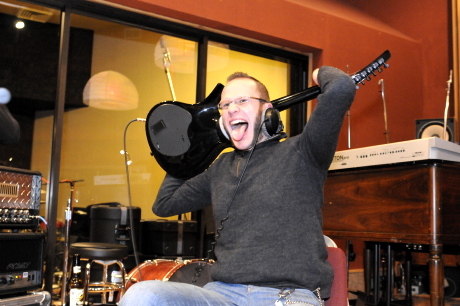
Aside from playing in this band and Killswitch, you're a producer and I wanted to ask you about that because you've had a lot of success with it with bands such as Shadows Fall and Unearth. To begin with, you studied production and engineering at Berklee, after that did you gain experience in studios as an intern?
"I did a lot of interning at the studio that I now normally work out of [Zing Studios, Massachusetts]. To be honest I feel like I've learned a heck of a lot more interning than I did at school. It's always good to study a subject at a university but producing is such a hands-on, learning through experience profession that learning on the job is very important."
What have been your proudest achievements as a producer?
"I'm extremely proud of the fact I've had several gold records. That's quite a feat - never in my mind would I have thought I'd be producing gold records. I'm thankful for being able to do that and working on any record that's somewhat successful is a really great feeling. I never really strived to become a hot shot big guy and here I am a modest guy trying to make good music and all of a sudden things become successful. It's overhwhelming."
How do you feel as someone in the studio industry about how accessible recording software and equipment has become?
"It's shocking to see how many studios have ended up closing. The recording industry is falling apart to be honest with you. People don't need hotshot expensive recording studios anymore to make records - they can do most of it at home if they are good at using ProTools software or whatever platform they're on. They can make a budget record and then hire someone at the end of the recording process to clean things up. Voila - there's your record."
But do you think standards can slip?
"Definitely, because if there's not a producer in the mix from the beginning a lot of things can get overlooked. Important things. In my personal experience I've definitely had some records sent to be mixed where some of the tracks were in very very poor shape. Probably because someone who's not a professionally minded producer ended up in charge of the record. Things can get out of hand."
Having said that, is there any equipment you can recommend to anyone that wants to record their music at home?
"I'm kind of biased because I was taught Pro Tools but I think it's a great platform and pretty much every studio out there uses it."
And you're working on the next Unearth album…
"Yes that's starting in late December / early January. I love working with those guys - they're such good friends. We always have fun."
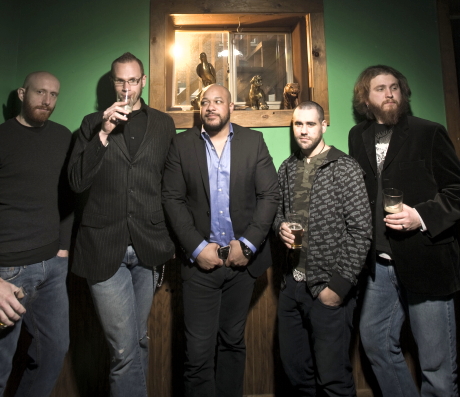
Adam began as Killswitch Engage's drummer before moving to guitar
What's your schedule looking like for 2011 as a guitarist - will there be Killswitch duties as well as Times Of Grace?
"As of right now I think Killswitch is thinking about writing a new record so I think Times Of Grace are doing something in February with regards to touring."
"Not everyone's the person they are assumed to be onstage. I bump into people and they say, You mean you don't wear a cape offstage?!"
You mentioned that your back is a lot better now, but what precautions do you need to bear in mind when it comes to playing?
"If I'm onstage and I'm moving around a lot it's always better to keep it on the lighter side. The doctor says I shouldn't be lifting anything heavy and I suppose that if I'm jumping off of stuff with a 10-15lb guitar it's probably a bad idea. I guess it's about being smart about it."
Is that part of the reason you wear your guitar quite high?
"I've always preferred to have the guitar quite high because it's just more comfortable to me. By the looks of what I wear onstage with Killswitch, I'm not really concerned with the way I look!"
Safe to say your Killswitch cape won't be getting an airing with this band…
"This is much more serious song matter, instead of being a party band this is a serious thing."
And it's good for people to see that other side of you…
"Of course. Not everyone's the person they are assumed to be onstage. I bump into people and they say, You mean you don't wear a cape offstage?! No dude, I'm just a normal guy - I got to the grocery store and bank and don't wear my cape. [laughs]"
Times Of Grace's album Hymn Of A Broken Man is out now on Roadrunner. Find out more about the band at the official Times Of Grace website.

Rob is the Reviews Editor for GuitarWorld.com and MusicRadar guitars, so spends most of his waking hours (and beyond) thinking about and trying the latest gear while making sure our reviews team is giving you thorough and honest tests of it. He's worked for guitar mags and sites as a writer and editor for nearly 20 years but still winces at the thought of restringing anything with a Floyd Rose.